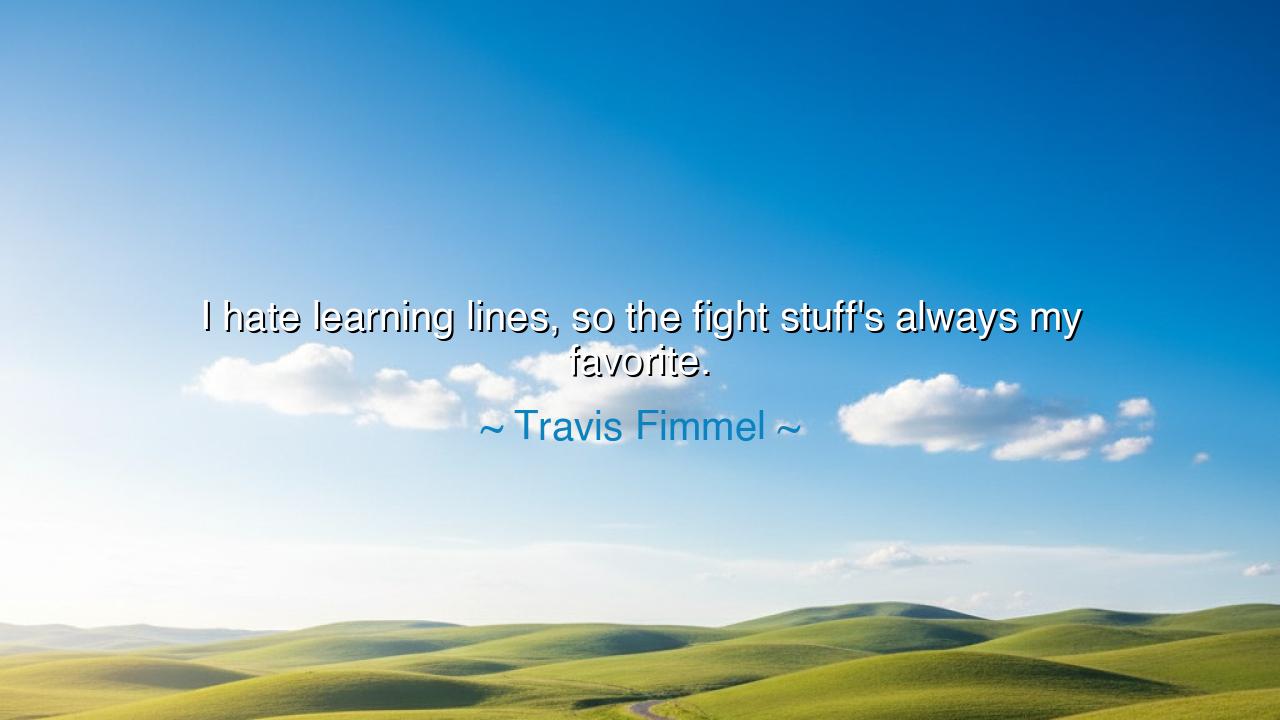
I hate learning lines, so the fight stuff's always my favorite.






When Travis Fimmel said, “I hate learning lines, so the fight stuff’s always my favorite,” his words, though simple, reveal a truth that stretches far beyond the craft of acting. Beneath their casual humor lies a deep reflection on the nature of instinct, struggle, and authenticity. For in every field — whether art, battle, or life itself — there are those who find their truest selves not in memorization or method, but in the raw, living moment. What Fimmel, the actor best known for portraying the fierce and contemplative Ragnar Lothbrok in Vikings, expresses here is not mere preference, but a philosophy: that real engagement is born through action, not rehearsal; through feeling, not formula.
In the ancient world, the warriors and philosophers alike understood this balance between preparation and spontaneity. The great strategist Sun Tzu taught that the art of war cannot be contained in rules, for true mastery lies in adapting to the moment. A fighter may train for years, yet in battle, instinct guides the final blow. Likewise, Fimmel’s love for the “fight stuff” — the physical, the immediate, the unscripted — reflects a yearning for that primal truth: to be fully alive in the moment of struggle. Where memorized lines belong to intellect, combat belongs to the body and spirit — and in that union of movement and emotion, art becomes visceral and real.
We might also hear, in Fimmel’s words, a rebellion against rigidity. The actor who “hates learning lines” is not lazy, but restless — unwilling to confine himself within pre-written boundaries. His craft thrives on freedom, instinct, and presence. He reminds us that true performance — whether on the stage of art or the stage of life — cannot be entirely scripted. To live authentically, one must sometimes throw away the script, abandon the planned speech, and act from the heart. In this way, Fimmel’s statement becomes a metaphor for life itself: the fight scenes represent those moments of chaos and trial when we are forced to trust ourselves, to move without thinking, to let our spirit lead.
Consider the legendary warrior Miyamoto Musashi, the undefeated samurai and philosopher. In his Book of Five Rings, Musashi wrote that “technique is nothing; it is the spirit that wins.” He trained endlessly, yes, but in battle he trusted his flow — striking without hesitation, thinking without thought. Musashi, like Fimmel, understood that the truest mastery is born not from memorizing forms, but from merging with them so completely that action becomes instinct. Fimmel’s “fight stuff” — the scenes where chaos breathes and instinct takes over — are his own battlefield of expression, where preparation meets intuition, and art transcends its boundaries.
Yet, Fimmel’s words also carry a lesson in humility. For in admitting that he “hates learning lines,” he confesses what many hide: that discipline alone is not enough to make greatness. It is the balance of discipline and passion, of structure and freedom, that gives birth to excellence. The mind may rebel against repetition, but the soul hungers for meaning — and sometimes, that meaning is found only in the clash, the movement, the unplanned dance of creation. Thus, the fight scenes he loves are not mere violence, but metaphors for engagement — for being present in the struggle, fully awake to life’s immediacy.
Throughout history, artists, warriors, and thinkers have found their strength not in reciting what they know, but in embodying what they feel. Michelangelo, when carving the statue of David, once said he simply “freed the angel from the stone.” So too does Fimmel, in the heat of a fight scene, free the truth from the script. His art comes alive when thought gives way to instinct — when words fall silent and motion speaks. It is in that silence — that surrender to the moment — where we find the essence of creativity itself: not cold perfection, but raw vitality.
And so, the teaching of Travis Fimmel’s quote is this: Do not fear the fight, nor despise the struggle. It is in those moments — unscripted, unpredictable, alive — that you meet your truest self. Prepare, yes; study, yes; but when the time comes, act with your whole being. Speak less from memory and more from truth. For whether on the battlefield, the stage, or the path of life, victory belongs not to those who recite the lines perfectly, but to those who feel them in their blood.
Thus, let his words echo as a reminder: embrace the living moment. The lines will fade, but the spirit that fights, feels, and creates — that is eternal. When life thrusts you into its chaos, do not retreat to the safety of rehearsed responses. Step forward, as Fimmel does in his “fight scenes” — eyes open, heart fierce, soul awake — and let the unspoken wisdom of instinct guide you to your truest performance.






AAdministratorAdministrator
Welcome, honored guests. Please leave a comment, we will respond soon